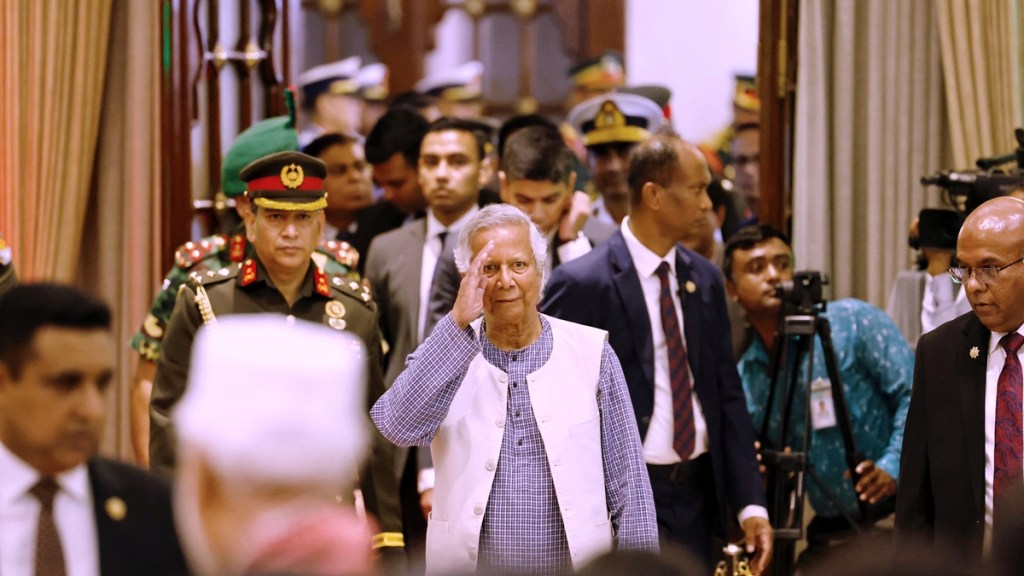Bangladesh’s interim government head, Muhammad Yunus, has criticised former Prime Minister Sheikh Hasina for making political remarks from India, calling it an “unfriendly gesture.” Yunus asserted that Hasina should remain silent until Dhaka formally requests her extradition to avoid creating discomfort for both nations.
“If India wishes to keep her until Bangladesh asks for her return, the condition is that she should stay quiet,” Yunus stated in an interview with PTI at his official residence in Dhaka.
Yunus, who assumed the role of Chief Advisor after Hasina’s ouster, emphasised that while Bangladesh values its strong ties with India, New Delhi must move beyond a narrow narrative. He cautioned against portraying every political party besides the Awami League as Islamist, suggesting that Bangladesh would not spiral into chaos without Hasina’s leadership.
“No one is comfortable with her stance in India. We want her back to face trial. Her comments from India, where she is issuing political statements, are problematic. Had she remained silent, we could have forgotten her presence. But her political activities are creating difficulties,” he said.
Yunus was referring to Hasina’s August 13 statement, where she called for “justice” and demanded that those involved in recent violent acts be held accountable.
“It’s not good for us or India. There is discomfort over this,” Yunus told PTI.
Following intense anti-government protests that climaxed on August 5, Hasina resigned and fled to India. Her prolonged stay there has sparked widespread speculation in Bangladesh.
When asked if Bangladesh had formally communicated its position to India, Yunus confirmed that the message had been conveyed verbally, urging Hasina to stay quiet.
“We have firmly stated that she should refrain from speaking. Her political activities in India are an unfriendly gesture toward us. She fled after facing public outrage, and now she is campaigning from there,” Yunus added.
Yunus reaffirmed the interim government’s commitment to seeking justice for the people of Bangladesh against what he described as “atrocities” committed by Hasina. He emphasized the need for her to return to face trial.
“She must be brought back, or the people of Bangladesh will not find peace. The atrocities she committed must be tried in front of the nation,” he stressed.
Addressing the future of India-Bangladesh relations, Yunus called for a reset, urging New Delhi to abandon the narrative that only Hasina’s leadership ensures Bangladesh’s stability.
“India needs to move beyond the narrative that everyone outside of Awami League is Islamist. Bangladesh is a sovereign neighbour, not one dependent on any single leader,” he said.
On the issue of attacks against Hindu minorities in Bangladesh, Yunus downplayed the concerns, suggesting they are often used as an excuse to escalate tensions.
“Attempts to portray the minority situation in an exaggerated way are just an excuse,” Yunus said.
The Hindu minority in Bangladesh has suffered property damage and attacks on temples during the violent unrest that followed Hasina’s ouster.
In his August 15 Independence Day address, Indian Prime Minister Narendra Modi expressed concern over the violence in Bangladesh, calling for peace and safety for Hindus and minorities in the neighbouring country.
Yunus, an 84-year-old Nobel laureate, emphasized the importance of rebuilding strained ties between India and Bangladesh. He acknowledged that the relationship is currently on a downturn.
“We need to collaborate to improve relations, which have been declining recently,” he noted.
Regarding future bilateral treaties, Yunus indicated that certain agreements, including the Adani electricity deal, may require review.
“There are calls for revisiting treaties like transit and the Adani deal. We’ll assess what’s on paper and what’s happening in reality. If necessary, we’ll question the agreements,” he said.
The Bangladesh Nationalist Party (BNP) has already pledged to review and re-evaluate the controversial Adani electricity deal, criticizing it as an undue burden on Bangladesh’s people, signed during Hasina’s tenure.

